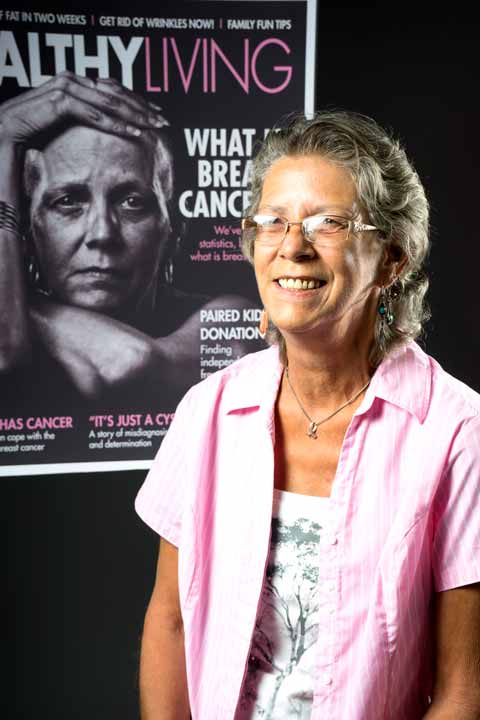In Pursuit of Happiness
Being a “happy camper” will help you effectively cope with life’s daily struggles and challenges.
The constant demands of a job. The death of a family member or friend. A troubled relationship with a spouse. These are problems everyone will face at one time or another. You may be unable to control your circumstances, but you can control how you react to them.
There are countless reasons why remaining happy brings joy to your life. Happiness protects your health, improves social relationships, and counteracts unwanted negative emotions.
In addition, being happy means you’re more likely to help others and have a more positive influence on your loved ones. In this article, we’re delving into important elements of happiness—self-love, attitude, loving others, acceptance, gratitude, and laughter—and looking at each through the eyes of Lake County residents.
While a few of them overcame considerable hardships and challenges, they ultimately emerged stronger because they refused to let negativity trump happiness. Simply put, striving to lead a happier life is definitely something everyone should add to the to-do list.
Self-Love

Emily-Middleton
An unhealthy obsession with body image as a high school student triggered Emily Middleton’s seven-year battle with bulimia. “It started out as a body image issue, then it became a control issue,” says Emily, a resident of Eustis. “I would eat uncontrollably and then go vomit.”
For Emily, discovering the power of self-love proved one of the most important tools in her road to recovery. “When you discover self-love, you celebrate all that is good about life and recognize your own worth, beauty, and strength.” Today, Emily is helping others as an intake coordinator of The Recovery Village, a residential treatment facility in Umatilla for people suffering from drug addiction, mental health issues, and eating disorders. “I feel incredibly blessed to work here because during my times of struggles I knew I wanted to help others,” she says. “I use my struggles to inspire people and help them experience hope and self-love. Loving yourself is the best way to permanently heal an addiction.”
Attitude
A positive attitude helps you successfully cope with life’s daily challenges and is vitally important to overall emotional and physical well-being. That’s what Minneola resident Marla Khetem learned when she lost her uncle, Doug Richardson, three years ago to ALS. “He was more like the older brother I never had,” says Marla. “When I was in second grade, I participated in a Girl Scout contest to see who could sell the most cookies. Because he was a lobbyist in Washington, D.C., he sold cookies to legislative aides and helped me win the contest. He was always a phone call away whenever I needed someone to talk to.” Marla learned an important life lesson from her uncle: Attitude is everything, and always look for the silver lining even during challenging times.
Marla followed that advice by not allowing death to take the joy out of living. In fact, she and her daughter, Mariah, raised nearly $6,000 for ALS research during the past three years. “Every day, I try to be as positive as I can be in carrying his torch. As a result, this helps improve my outlook on life, as well as my attitude toward myself and others.”
Loving Others
Some people teach their dogs to heel. Eustis resident Ryna LaValle teaches her golden retriever to heal. And she has a doggone good time putting smiles on the faces of people who are sick or lonely. Ryna is founder of Caring Canines Therapy Dogs, a nonprofit organization comprised of dog owners who take their pet dogs to nursing homes, assisted-living facilities, schools, libraries, and Camp Boggy Creek.
The mere presence of a canine is therapeutic, lifting the spirits of a lonely elderly person in a nursing home, instilling confidence in a student to read a book, or comforting an Alzheimer’s patient in a memory-care unit. Those special visits are every bit as heartwarming for Ryna as they are for patients and students. “I’ve always been a dog lover, and this is my way of helping other people,” she says. “Some of the patients we see at nursing homes seldom have any other visitors. When I show up with my dog, you can instantly see the expression on their face turn from a frown to a smile. Helping others brings me lasting happiness, and I’ll continue sharing my dogs until I can no longer do so.
Acceptance

Vicky McGhee
“You have breast cancer.” Those were the horrifying words told to Altoona resident Vicky McGhee in 2009. Ultimately, she had both breasts removed, which took an emotional toll on her self-esteem and femininity. “I no longer felt like me,” she said. “I did not like how I looked on the outside.” In time, though, Vicky discovered a healthy balance between acceptance and anger.
While she has numerous scars from two mastectomies, she views them as battle scars to remind her to live with courage and strength each and every day. “When I finally accepted my cancer diagnosis and everything I had to go through just to live, I realized I was a stronger person that I thought. I found an inner strength and serenity that everything was going to turn out okay. I also found a new sense of joy and happiness in the little moments of life. Believe it or not, having cancer can turn out to be a very positive experience.”
Gratitude
Gratitude is something Keith Adee of The Villages experiences everyday. When he launched his website, Villages1.com, in 2006, he wanted people to have access to a wealth of information pertaining to The Villages and surrounding area. He never dreamed about making money off it. Then something magical happened. “Before long, people began approaching me and asking if they could advertise on the website,” he said.
Between 2012 and 2015, his business doubled each year. And in 2015, his website attracted a record 1,800,000 visitors. Keith displays his gratitude by providing local food banks and soup kitchens with eight ounces of food each time a new visitor accesses Villages1.com. “The Lord has been good to me, and I want to share that with people who are less fortunate,” Keith said. “I also wanted my sponsors to know that their money wasn’t just going toward advertising; it is going back into the community. For me, gratitude is important because I stop and think about all the wonderful things I have in life.”
Laughter
Villager Pona Das and his wife Ginger love a good laugh. They believe it’s not only a good way of life to never sweat the small stuff, but they also know laughing carries health benefits. “Laughing releases endorphins that help with pain, stress, and depression,” says Ginger. “It also helps expel dead air so you can get more oxygen.” Pona and Ginger head up the Laughing Yoga Club in The Villages. Pona got the idea to form the club five years ago after visiting family in India. Laughing Yoga, or Laughter Yoga, was developed by Dr. Madan Kataria, a medical doctor from India.
The concept is based on scientific evidence that the body benefits physiologically and psychologically from laughter, whether it be real or fake. Every day, Ginger and Pona make it a point to laugh—and laugh often. “We don’t wait for class,” Ginger says and smiles. “It’s been great because this club allowed us to meet new people and make new friends. We’re at a time in our lives where every day is a blessing and laughing helps us get through each day.”
TEN HAPPY SONGS
1. “Happy Together”—The Turtles
2. “If You Wanna Be Happy”—Jimmy Soul
3. “Shiny Happy People” —R.E.M.
4. “Happy”—Pharrell
5. “Don’t Worry, Be Happy”—Bobby McFerrin
6. “My Happiness”—Connie Francis
7. “You’ve Made Me So Very Happy”—Blood, Sweat, and Tears
8. “Love Can Make You Happy”—Mercy
9. “Happy Birthday, Sweet Sixteen”—Neil Sedeka
10. “Oh How Happy”—Shades of Blue
CHARACTERISTICS OF BEING UNHAPPY
• Unhappy people hate their jobs.
• Unhappy people constantly worry about money.
• Unhappy people do not have active hobbies.
• Unhappy people think material possessions will make them happy.
• Unhappy people are lonely.
• Unhappy people do not like the town they live in.
• Unhappy people do not have pets.
• Unhappy people do not like themselves.
Source: care2.com/greenliving/10-things-unhappy-people-have-in-common-2.html
UNHAPPY BY THE NUMBERS
6
The number of hours per day of socializing that leads to the highest levels of happiness.
5
The number of positive interactions that successful married couples have to every negative one.
1 in 3:
The number of Americans who say they’re very happy, according to a 2013 Harris poll.
Happy employees produce
37%
greater sales than unhappy employees do.
Employees who like their jobs have
10 times fewer sick days
than employees who do not like their jobs.

